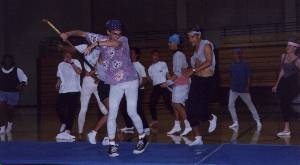| Table of Contents |
| Prologue |
| Chapter I |
| Chapter II |
| Epilogue |
| Appendix I |
| Appendix II |
| Appendix III |
| Appendix IV |
| Appendix V |
| Appendix VI |
| The Final Appendix |
![]()
Appendix II
Very Like A Whale
by
Ogden Nash
One thing that Literature would be greatly the better for Would be a more restricted employment by authors of simile and metaphor. Authors of all races, be they Greeks, Romans, Teutons or Celts, Can't seem just to say that anything is the thing it is but have to go out of their way to say it is like something else. What does it mean when we are told That the Assyrian came down like a wolf on the fold? In the first place, George Gordon Byron had had enough experience To know that it probably wasn't just one Assyrian, it was a lot of Assyrians. However, as so many arguments are apt to induce apoplexy and thus hinder longevity, We'll let it pass as one Assyrian for the sake of brevity. Now then, this particular Assyrian, the one whose cohorts were gleaming in purple and gold, Just what does the poet mean when he says he came down like a wolf on the fold? In heaven and earth more than is dreamed of in our philosophy there are great many things, But I don't imagine that among them there is a wolf with purple and gold cohorts or purple and gold anythings. No, no, Lord Byron, before I'll believe that this Assyrian was actually like a wolf I must have some kind of proof; Did he run on all fours and did he have a hairy tail and a big red mouth and big white teeth and did he say Woof woof? Frankly I think it very unlikely, and all you were entitled to say, at the very most, Was that the Assyrian cohorts came down like a lot of Assyrian cohorts about to destroy the Hebrew host. But that wasn't fancy enough for Lord Byron, oh dear me no, he had to invent a lot of figures of speech and then interpolate them, With the result that whenever you mention Old Testament soldiers to people they say Oh yes, they're the ones that a lot of wolves dressed up in gold and purple ate them. That's the kind of thing that's being done all the time by poets, from Homer to Tennyson; They're always comparing ladies to lilies and veal to venison, And they always say things like that the snow is a white blanket after a winter storm. Oh it is, is it, all right then, you sleep under a six-inch blanket of snow and I'll sleep under a half-inch blanket of unpoetical blanket material and we'll see which one keeps warm, And after that maybe you'll begin to comprehend dimly What I mean by too much metaphor and simile.
The World According to Student Bloopers
Richard Lederer
St. Paul's School
One of the fringe benefits of being an English or History teacher is receiving the occasional jewel of a student blooper in an essay. I have pasted together the following "history" of the world from certifiably genuine student bloopers collected by teachers throughout the United States, from eight grade through college level. Read carefully, and you will learn a lot.
The inhabitants of Egypt were called mummies. They lived in the Sarah Dessert and traveled by Camelot. The climate of the Sarah is such that the inhabitants have to live elsewhere, so certain areas of the dessert are cul- tivated by irritation. The Egyptians built the Pyramids in the shape of a huge triangular cube. The Pramids are a range of mountains between France and Spain.
The Bible is full of interesting caricatures. In the first book of the Bible, Guinesses, Adam and Eve were created from an apple tree. One of their children, Cain, asked "Am I my brother's son?" God asked Abraham to sacrifice Issac on Mount Montezuma. Jacob, son of Issac, stole his brother's birthmark. Jacob was a partiarch who brought up his twelve sons to be partiarchs, but they did not take to it. One of Jacob's sons, Joseph, gave refuse to the Israelites.
Pharaoh forced the Hebrew slaves to make bread without straw. Moses led them to the Red Sea, where they made unleavened bread, which is bread made without any ingredients. Afterwards, Moses went up on Mount Cyanide to get the ten commandments. David was a Hebrew king skilled at playing the liar. He fougth with the Philatelists, a race of people who lived in Biblical times. Solomon, one of David's sons, had 500 wives and 500 porcupines.
Without the Greeks, we wouldn't have history. The Greeks invented three kinds of columns - Corinthian, Doric and Ironic. They also had myths. A myth is a female moth. One myth says that the mother of Achilles dipped him in the River Stynx until he became intolerable. Achilles appears in "The Illiad", by Homer. Homer also wrote the "Oddity", in which Penelope was the last hardship that Ulysses endured on his journey. Actually, Homer was not written by Homer but by another man of that name.
Socrates was a famous Greek teacher who went around giving people advice. They killed him. Socrates died from an overdose of wedlock.
In the Olympic Games, Greeks ran races, jumped, hurled the biscuits, and threw the java. The reward to the victor was a coral wreath. The government of Athen was democratic because the people took the law into their own hands. There were no wars in Greece, as the mountains were so high that they couldn't climb over to see what their neighbors were doing. When they fought the Parisians, the Greeks were outnumbered because the Persians had more men.
Eventually, the Ramons conquered the Geeks. History call people Romans because they never stayed in one place for very long. At Roman banquets, the guests wore garlic in their hair. Julius Caesar extinguished himself on the battlefields of Gaul. The Ides of March killed him because they thought he was going to be made king. Nero was a cruel tyrany who would torture his poor subjects by playing the fiddle to them.
Then came the Middle Ages. King Alfred conquered the Dames, King Arthur lived in the Age of Shivery, King Harlod mustarded his troops before the Battle of Hastings, Joan of Arc was cannonized by George Bernard Shaw, and the victims of the Black Death grew boobs on their necks. Finally, the Magna Carta provided that no free man should be hanged twice for the same offense.
In midevil times most of the people were alliterate. The greatest writer of the time was Chaucer, who wrote many poems and verse and also wrote liter- ature. Another tale tells of William Tell, who shot an arrow through an apple while standing on his son's head.
The Renaissance was an age in which more individuals felt the value of their human being. Martin Luther was nailed to the church door at Wittenberg for selling papal indulgences. He died a horrible death, being excommunicated by a bull. It was the painter Donatello's interest in the female nude that made him the father of the Renaissance. It was an age of great inventions and discoveries. Gutenberg invented the Bible. Sir Walter Raleigh is a historical figure because he invented cigarettes. Another important invention was the circulation of blood. Sir Francis Drake circumcised the world with a 100-foot clipper.
The government of England was a limited mockery. Henry VIII found walking difficult because he had an abbess on his knee. Queen Elizabeth was the "Vir- gin Queen." As a queen she was a success. When Elizabeth exposed herself be- fore her troops, they all shouted "hurrah." Then her navy went out and defeated the Spanish Armadillo.
The greatest writer of the Renaissance was William Shakespear. Shakespear never made much money and is famous only because of his plays. He lived in Windsor with his merry wives, writing tragedies, comedies and errors. In one of Shakespear's famous plays, Hamlet rations out his situation by relieving himself in a long soliloquy. In another, Lady Macbeth tries to convince Macbeth to kill the King by attacking his manhood. Romeo and Juliet are an example of a heroic couplet. Writing at the same time as Shakespear was Miquel Cervantes. He wrote "Donkey Hote". The next great author was John Milton. Milton wrote "Paradise Lost." Then his wife dies and he wrote "Paradise Regained."
During the Renaissance America began. Christopher Columbus was a great navigator who discovered America while cursing about the Atlantic. His ships were called the Nina, the Pinta, and the Santa Fe. Later the Pilgrims crossed the Ocean, and the was called the Pilgrim's Progress. When they landed at Plymouth Rock, they were greeted by Indians, who came down the hill rolling their was hoops before them. The Indian squabs carried porposies on their back. Many of the Indian heroes were killed, along with their cabooses, which proved very fatal to them. The winter of 1620 was a hard one for the settlers. Many people died and many babies were born. Captain John Smith was responsible for all this.
One of the causes of the Revolutionary Wars was the English put tacks in their tea. Also, the colonists would send their pacels through the post with- out stamps. During the War, Red Coats and Paul Revere was throwing balls over stone walls. The dogs were barking and the peacocks crowing. Finally, the colonists won the War and no longer had to pay for taxis.
Delegates from the original thirteen states formed the Contented Congress. Thomas Jefferson, a Virgin, and Benjamin Franklin were two singers of the Declaration of Independence. Franklin had gone to Boston carrying all his clothes in his pocket and a loaf of bread under each arm. He invented elec- tricity by rubbing cats backwards and declared "a horse divided against itself cannot stand." Franklin died in 1790 and is still dead.
George Washington married Matha Curtis and in due time became the Father of Our Country. Them the Constitution of the United States was adopted to secure domestic hostility. Under the Constitution the people enjoyed the right to keep bare arms.
Abraham Lincoln became America's greatest Precedent. Lincoln's mother died in infancy, and he was born in a log cabin which he built with his own hands. When Lincoln was President, he wore only a tall silk hat. He said, "In onion there is strength." Abraham Lincoln write the Gettysburg address while traveling from Washington to Gettysburg on the back of an envelope. He also signed the Emasculation Proclamation, and the Fourteenth Amendment gave the ex-Negroes citizenship. But the Clue Clux Clan would torcher and lynch the ex-Negroes and other innocent victims. On the night of April 14, 1865, Lincoln went to the theater and got shot in his seat by one of the actors in a moving picture show. The believed assinator was John Wilkes Booth, a sup- posedl insane actor. This ruined Booth's career.
Meanwhile in Europe, the enlightenment was a reasonable time. Voltare invented electricity and also wrote a book called "Candy". Gravity was invented by Issac Walton. It is chiefly noticeable in the Autumn, when the apples are flaling off the trees.
Bach was the most famous composer in the world, and so was Handel. Handel was half German, half Italian and half English. He was very large. Bach died from 1750 to the present. Beethoven wrote music even though he was deaf. He was so deaf he wrote loud music. He took long walks in the forest even when everyone was calling for him. Beethoven expired in 1827 and later died for this.
France was in a very serious state. The French Revolution was accomplished before it happened. The Marseillaise was the theme song of the French Revolu- tion, and it catapulted into Napoleon. During the Napoleonic Wars, the crowned heads of Europe were trembling in their shoes. Then the Spanish gorrilas came down from the hills and nipped at Napoleon's flanks. Napoleon became ill with bladder problems and was very tense and unrestrained. He wanted an heir to inheret his power, but since Josephine was a baroness, she couldn't bear him any children.
The sun never set on the British Empire because the British Empire is in the East and the sun sets in the West. Queen Victoria was the longest queen. She sat on a thorn for 63 years. He reclining years and finally the end of her life were exemplatory of a great personality. Her death was the final event which ended her reign.
The nineteenth century was a time of many great inventions and thoughts. The invention of the steamboat caused a network of rivers to spring up. Cyrus McCormick invented the McCormick Raper, which did the work of a hundred men. Samuel Morse invented a code for telepathy. Louis Pastuer discovered a cure for rabbis. Charles Darwin was a naturailst who wrote the "Organ of the Species". Madman Curie discovered radium. And Karl Marx became one of the Marx Brothers.
The First World War, cause by the assignation of the Arch-Duck by a surf, ushered in a new error in the anals of human history.
- Do they have a 4th of July in England?
- How many birthdays does the average man have?
- If you had only one match and entered a room in which there was a kerosene lamp, an oil heater, and a wood burning stove, which would you light first?
- Why can't a man living in Winston Salem, N.C. be buried west of the Mississippi River?
- Some months have 30 days, some have 31 days, how many have 28?
- If a doctor gave you three pills and told you to take one every half hour, how long would they last you?
- How far can a dog run into the woods?
- What four words appear on every denomination of U.S. coin?
- I have in my hand only 2 U.S. coins which total 55 cents in value. One is not a nickel. What are the two coins?
- A farmer has 17 sheep. All but 9 died. How many did he have left?
- Divide 30 by ½ and then add 10. What is the answer?
- Two men were playing checkers. Each played five games and each won the same number of games. No draws. How can you figure this?
- Take two apples from three apples and what do you have?
- An archeologist claimed he found some coins of gold dated 45 B.C. Do you think he really did? Why or why not.
- A woman gives a beggar 50 cents. The woman is the beggar's sister, but the beggar is not the woman's brother. How come?
- How many animals of each species did Moses take aboard the Ark with him?
- Is it legal in California for a man to marry his widow's sister?
- What word is mispelled on this page?
- A plane crashed on the border between the U.S. and Mexico. In what country must the survivors be buried?
What the Professor Really Means
by J. Timothy Peters
from the Chronicles of Higher Education
- You'll be using one of the leading textbooks in the field. - I used it as a grad student.
- If you follow these few simple rules, you'll do fine in the course. - If you don't need any sleep, you'll do fine in the course.
- The gist of what the author is saying is what's most important. - I don't understand the details, either.
- Various authorities agree that... -My hunch is that...
- The answer to your question is beyond the scope of this class. - I don't know.
- You'll have to see me during my office hours for a thorough answer to your question. - I don't know.
- In answer to your question, you must recognize that there are several disparate points of view. - I really don't know.
- Today we are going to discuss a most important topic. - Today we are going to discuss my dissertation.
- Unfortunately, we haven't the time to consider all of the people who made contributions to this field. - I disagree with that roughly half of the people in this field have said.
- We can continue this discussion outside of class. - 1. I'm tired of this, let's quit. 2. You're winning the argument, let's quit.
- Today we'll let a member of the class lead the discussion. It will be a good educational experience. - I stayed out too late last night and I didn't have time to prepare form a lecture.
- Any questions? - I'm ready to let you go.
- The implications of this study are clear. - I don't know what it means either, but there'll be a question about it on the test.
- The test will be 50-questions multiple-choice. - The test will be 60-questions multiple-choice, plus three short-answer questions (1000 words or more) and no one will score above 55 percent.
- The test scores were generally good. - Some of you managed a C+.
- The test scores were a little below my expectations. - Where was the party last night?
- Some of you could have done better. - Everyone flunked.
- Before we begin the lecture for today, are there any questions about previous material? - Has anyone opened the book yet.
- According to my sources... - According to the guy who taught this class last year...
- It's been very rewarding to teach this class. - I hope they find someone else to teach it next year.
[ Table of Contents | Back | Next Page | Top ]
This page is written and maintained by Steve Krause. © Steve Krause. All rights reserved. For more information, email hyperion47@excite.com.
This page was last updated on June 27, 1998.



